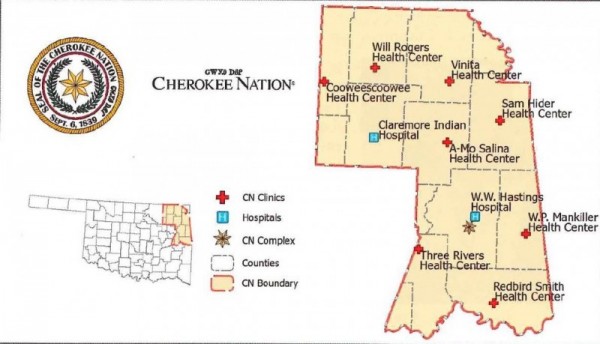
- Details
- By Chuck Hoskin Jr
Opinion. I live on reservation land, where I am governed by the Cherokee Nation and federal laws. I also live in the state of Oklahoma, where I am proud of our tribe’s successful partnership with the state government over decades.
Unfortunately, Gov. Kevin Stitt seems to believe those two facts are mutually exclusive.
Following the U.S. Supreme Court decision in McGirt v. Oklahoma, tribes celebrated the long overdue recognition that our land remains our land and that Congress never disestablished our reservations. As Principal Chief of the Cherokee Nation, I celebrate the ruling while also recognizing that it creates challenges. The ruling concludes that Oklahoma has been prosecuting criminal cases that do not fall under its jurisdiction for years. Now that this error has been corrected, tribes are working swiftly to expand our capacity to ensure justice continues smoothly for our citizens and all Oklahomans.
Indian Country has met greater challenges in the past. I am confident that we can work with state and federal governments to resolve this challenge without infringing on our sovereignty.
However, it’s become clear that Gov. Stitt’s vision for Oklahoma does not include a role for tribes. After McGirt, he formed a commission chaired by an energy executive with no tribal representation. That commission has called for taking away tribal authority over our own land. They use anti-Indian language reminiscent of the 19th century to argue for dispossessing tribes of our homelands. They describe an “undesirable” life on our land that is “separated from the rest of society.” That is not the view of most people who live in eastern Oklahoma. It is not the view of people who have respect for tribal governments.
The governor’s commission pretends that tribes are not sophisticated enough to work with the state on a government-to-government basis. Yet we have done this successfully for years, on issues ranging from child welfare to domestic violence prevention.

We have better options to address gaps in criminal law without taking away tribal rights. Gov. Stitt simply needs to look at the proposal from Oklahoma Attorney General Mike Hunter, who recently called on Congress to allow Oklahoma to compact with tribes to share jurisdiction with the state on specific criminal cases. Compacting would preserve the sovereignty affirmed by McGirt while crafting new tools for tribal-state cooperation.
We must keep 100 percent of McGirt intact, and give tribes new powers to negotiate compacts with the state of Oklahoma. We need a better spirit of cooperation from the state, because we have no time to waste. We are already learning of cases that the federal government cannot prosecute because of the statute of limitations. Under federal law, our tribal courts cannot impose sentences longer than three years, even for serious crimes. Tribes are also generally unable to prosecute non-Indians who commit crimes on reservations. While the federal government may pursue these cases, it often does not.
A compact with the state could solve all these problems. Oklahoma could prosecute non-Indians with tribal approval. But Congress must allow for this kind of compact, as it has done in the past with laws like the Indian Child Welfare Act and numerous other issues. Compacting is a proven model for reaching practical solutions that do not diminish our sovereignty or disestablish our reservations.
In a letter to Oklahoma’s Congressional delegation, I encouraged consideration of Attorney General Hunter’s plan and warned of the dangers of Gov. Stitt’s approach. I know our delegation appreciates the role of tribes in Oklahoma, and I hope they agree that any proposal which tries to erase the role of tribes is unacceptable.
The Cherokee Nation and Oklahoma are not at odds. We have the same goals of safety and justice for all Cherokees and all Oklahomans. Stitt must commit to working with tribes rather than trying to exclude us from the process.
Chuck Hoskin, Jr. is the principal chief of the Cherokee Nation.
More Stories Like This
The SAVE America Act Threatens Native Voting Rights — We Must Fight BackThe Presidential Election of 1789
Cherokee Nation: Telling the Full Story During Black History Month
Jesse Jackson Changed Politics for the Better
Native News Online at 15: Humble Beginnings, Unwavering Mission
Help us defend tribal sovereignty.
At Native News Online, our mission is rooted in telling the stories that strengthen sovereignty and uplift Indigenous voices — not just at year’s end, but every single day.
Because of your generosity last year, we were able to keep our reporters on the ground in tribal communities, at national gatherings and in the halls of Congress — covering the issues that matter most to Indian Country: sovereignty, culture, education, health and economic opportunity.
That support sustained us through a tough year in 2025. Now, as we look to the year ahead, we need your help right now to ensure warrior journalism remains strong — reporting that defends tribal sovereignty, amplifies Native truth, and holds power accountable.
 The stakes couldn't be higher. Your support keeps Native voices heard, Native stories told and Native sovereignty defended.
The stakes couldn't be higher. Your support keeps Native voices heard, Native stories told and Native sovereignty defended.
Stand with Warrior Journalism today.
Levi Rickert (Potawatomi), Editor & Publisher
